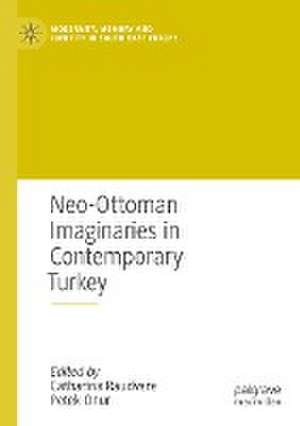Neo-Ottoman Imaginaries in Contemporary Turkey: Modernity, Memory and Identity in South-East Europe
Editat de Catharina Raudvere, Petek Onuren Limba Engleză Paperback – 14 dec 2023
This book presents gendered readings of cultural manifestations that relate to the Ottoman era as a preferred past and a model for the future. By means of claims of authenticity and the distribution of imaginaries of a homogenous desirable alternative to everyday concerns, as well as invoking an imperial past at the national level. In this mode of thinking, shaped around a polarised worldview, Republican ideals serve as a counter-image to the promoted splendour and harmony of the Ottomans. Yet, the stereotypical gender roles inextricably linked with this neo-Ottoman imaginary remain largely unacknowledged, dissimulated in the construction of the desire of an idealised past. Our adaption of a cultural studies perspective in this volume puts special emphasis on agency, gender, and authority. It provides a shared ground for the interrogation, through the contributions comprising this project of knowledge production about the past in light of what constitutes acceptable legitimacy in interpreting not only the canonical literature, but history at large.
| Toate formatele și edițiile | Preț | Express |
|---|---|---|
| Paperback (1) | 775.07 lei 6-8 săpt. | |
| Springer International Publishing – 14 dec 2023 | 775.07 lei 6-8 săpt. | |
| Hardback (1) | 780.26 lei 6-8 săpt. | |
| Springer International Publishing – 14 dec 2022 | 780.26 lei 6-8 săpt. |
Din seria Modernity, Memory and Identity in South-East Europe
- 17%
 Preț: 523.81 lei
Preț: 523.81 lei - 15%
 Preț: 696.89 lei
Preț: 696.89 lei - 15%
 Preț: 468.21 lei
Preț: 468.21 lei - 15%
 Preț: 498.84 lei
Preț: 498.84 lei - 15%
 Preț: 579.95 lei
Preț: 579.95 lei -
 Preț: 378.04 lei
Preț: 378.04 lei - 18%
 Preț: 774.64 lei
Preț: 774.64 lei - 18%
 Preț: 780.56 lei
Preț: 780.56 lei -
 Preț: 383.99 lei
Preț: 383.99 lei - 15%
 Preț: 495.90 lei
Preț: 495.90 lei - 18%
 Preț: 885.53 lei
Preț: 885.53 lei - 15%
 Preț: 576.88 lei
Preț: 576.88 lei - 18%
 Preț: 881.15 lei
Preț: 881.15 lei - 15%
 Preț: 638.42 lei
Preț: 638.42 lei - 15%
 Preț: 693.66 lei
Preț: 693.66 lei
Preț: 775.07 lei
Preț vechi: 945.21 lei
-18% Nou
Puncte Express: 1163
Preț estimativ în valută:
148.42€ • 152.93$ • 124.54£
148.42€ • 152.93$ • 124.54£
Carte tipărită la comandă
Livrare economică 21 februarie-07 martie
Preluare comenzi: 021 569.72.76
Specificații
ISBN-13: 9783031080258
ISBN-10: 3031080254
Pagini: 321
Ilustrații: XVI, 321 p. 65 illus.
Dimensiuni: 148 x 210 x 21 mm
Greutate: 0.41 kg
Ediția:1st ed. 2023
Editura: Springer International Publishing
Colecția Palgrave Macmillan
Seria Modernity, Memory and Identity in South-East Europe
Locul publicării:Cham, Switzerland
ISBN-10: 3031080254
Pagini: 321
Ilustrații: XVI, 321 p. 65 illus.
Dimensiuni: 148 x 210 x 21 mm
Greutate: 0.41 kg
Ediția:1st ed. 2023
Editura: Springer International Publishing
Colecția Palgrave Macmillan
Seria Modernity, Memory and Identity in South-East Europe
Locul publicării:Cham, Switzerland
Cuprins
Chapter 1: I am the Granddaughter of the Sultan’: Gender, Aesthetics and Agency in Neo-Ottoman Imaginaries.- Chapter 2: Neo-Ottomanism versus Ottomania: Contestation of Gender in Historical Drama.- Chapter 3: Lovers of the Rose: Islamic Affect and the Politics of Commemoration in Turkish Museal Display.- Chapter 4: Between Memory and Forgetting and Purity and Danger: The Case of the Ulucanlar Prison Museum.- Chapter 5: Architectures of Domination? Ideology, Neoliberalism and the Built Environment of ‘New Turkey’.- Chapter 6: Commemorating the First World War and its Aftermath: Neo-Ottomanism, Gender and the Politics of History in Turkey.- Chapter 7: The New Ottoman Henna Nights and Women in the Palace of Nostalgia.- Chapter 8: Claiming the Neo-Ottoman Mosque: Islamism, Gender, Architecture.- Chapter 9: Post-Truth and Anti-Science in Turkey: Putting it into Perspective.- Chapter 10: Mixed Marriage Patterns of Rum Orthodox, Jewish, and Armenian Communities of Istanbul: Gendering Ethno-Religious Boundaries.- Chapter 11: Epilogue: From the Past to the Future.
Notă biografică
Catharina Raudvere is Professor of the History of Religions at the University of Copenhagen, Denmark.
Petek Onur is Postdoctoral Researcher at the Department of Cross-Cultural and Regional Studies, University of Copenhagen, Denmark.
Textul de pe ultima copertă
This book presents gendered readings of cultural manifestations that relate to the Ottoman era as a preferred past and a model for the future. By means of claims of authenticity and the distribution of imaginaries of a homogenous desirable alternative to everyday concerns, as well as invoking an imperial past at the national level. In this mode of thinking, shaped around a polarised worldview, Republican ideals serve as a counter-image to the promoted splendour and harmony of the Ottomans. Yet, the stereotypical gender roles inextricably linked with this neo-Ottoman imaginary remain largely unacknowledged, dissimulated in the construction of the desire of an idealised past. Our adaption of a cultural studies perspective in this volume puts special emphasis on agency, gender, and authority. It provides a shared ground for the interrogation, through the contributions comprising this project of knowledge production about the past in light of what constitutes acceptable legitimacy in interpreting not only the canonical literature, but history at large.
Caracteristici
Shifts historical understanding of neo-Ottoman ideology away from politics Analyzes the relationship between mass media and cultural hegemony Offers new perspectives on contemporary Turkey and gender
